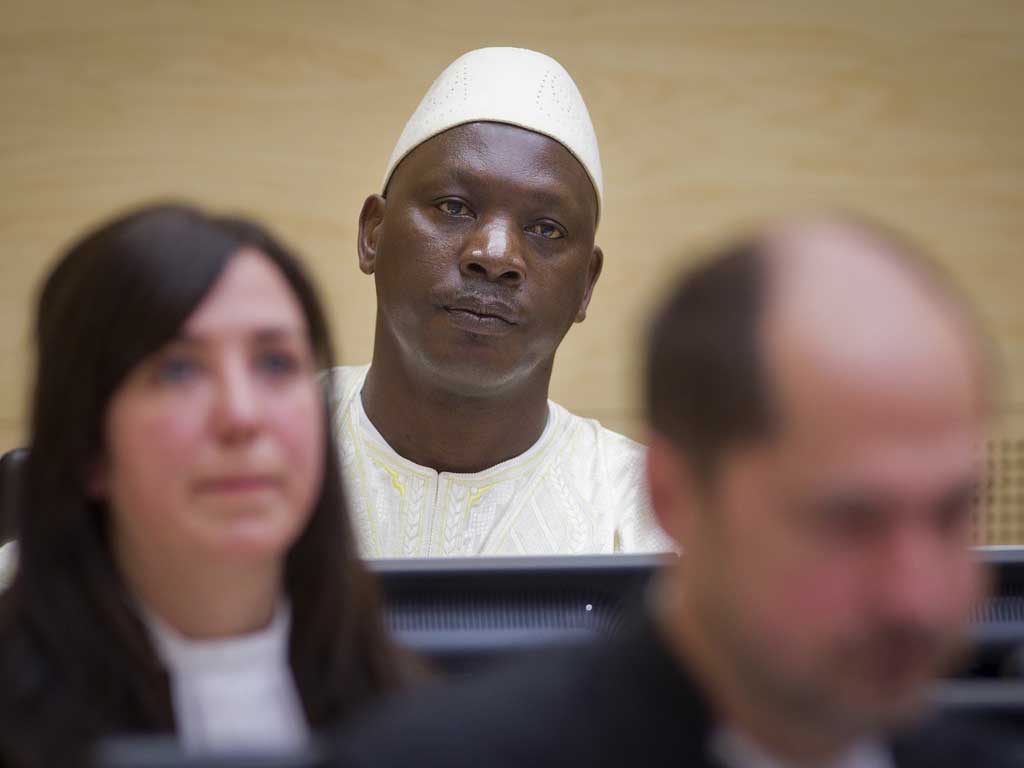Congo warlord Thomas Lubanga convicted of using child soliders

Your support helps us to tell the story
From reproductive rights to climate change to Big Tech, The Independent is on the ground when the story is developing. Whether it's investigating the financials of Elon Musk's pro-Trump PAC or producing our latest documentary, 'The A Word', which shines a light on the American women fighting for reproductive rights, we know how important it is to parse out the facts from the messaging.
At such a critical moment in US history, we need reporters on the ground. Your donation allows us to keep sending journalists to speak to both sides of the story.
The Independent is trusted by Americans across the entire political spectrum. And unlike many other quality news outlets, we choose not to lock Americans out of our reporting and analysis with paywalls. We believe quality journalism should be available to everyone, paid for by those who can afford it.
Your support makes all the difference.The International Criminal Court convicted a Congolese warlord of using child soldiers, a verdict hailed as a legal landmark in the fight against impunity for the world's most serious crimes.
Human rights advocates said the guilty verdicts against Thomas Lubanga — the first judgment in the court's 10-year history — should stand as a clear deterrent to armies around the world not to conscript children.
"In this age of global media, today's verdict will reach warlords and commanders across the world and serve as a strong deterrent," the UN's special representative for children and armed conflict, Radhika Coomaraswamy, said in a statement.
Actress and activist Angelina Jolie watched the verdicts from the court's public gallery and called them a victory for former child soldiers.
"This is their day — where these children will feel there is no impunity for what happened to them, for what they suffered," Jolie said.
Lubanga will be sentenced following a hearing that will be scheduled later this year. He faces a maximum of life imprisonment.
The judgment came at a time when the court is under scrutiny for its inability to arrest key war crimes suspects and its impotence in not being able to intervene in the bloody conflict raging in Syria.
The court was catapulted into the limelight last week by the viral video Kony 2012, which highlighted how it still has not had Ugandan rebel Joseph Kony arrested nearly seven years after indicting him for crimes including using child soldiers, murder and torture.
The court has no police force of its own and has to rely on states to enforce its arrest warrants.
It also can only open investigations in the 120 countries that have recognized its jurisdiction or at the request of the UN Security Council. Nations including the United States, China, Russia and Syria are not members.
That means it can't launch a probe into widespread allegations that forces loyal to Syrian President Bashar Assad are systematically committing atrocities to put down an anti-government revolt.
So far, all seven of the investigations launched by the court are in Africa.
The highest profile suspects among five in custody are former Ivory Coast President Laurent Gbagbo and ex-Congo Vice President Jean-Pierre Bemba. Sudanese President Omar al-Bashir has been indicted for genocide in Darfur but refuses to surrender to the court.
It took six years from the time Congo handed over Lubanga to his convictions, but ultimately the three-judge panel was unanimous in finding him guilty.
"The prosecution has proved beyond reasonable doubt that Mr. Thomas Lubanga is guilty of the crimes of conscripting and enlisting children under the age of 15 years and using them to participate actively in hostilities," said Presiding Judge Adrian Fulford.
Lubanga, wearing an ivory-colored robe and skull cap, sat with his hands clasped in front of him listening to the verdict and showed no emotion as Fulford declared him guilty.
As he left court flanked by guards, Lubanga nodded and smiled to supporters in the public gallery.
Congo's Justice Minister Luzolo Bambi congratulated the court and said, "The government of the Democratic Republic of Congo takes note of this verdict which marks an advance in international penal justice."
The victory for prosecutors came after the case twice nearly collapsed because of their failure to disclose evidence to defense lawyers and despite harsh criticism from judges in their written judgment.
Fulford said three intermediaries used by prosecutors to approach witnesses in Congo "persuaded, encouraged or assisted witnesses to give false evidence" and scrapped the evidence of three witnesses.
Rights activists also criticized prosecutors for not charging Lubanga with sexual violence crimes, despite allegations that women and girls were raped and abused by his forces.
"The Prosecutor's office must review its limited investigation strategy adopted in the Lubanga case," said Michael Bochenek of Amnesty International. "Lessons need to be learned for future cases."
Lubanga led the Union of Congolese Patriots political group and commanded its armed wing, the Patriotic Forces for the Liberation of Congo, which recruited children — sometimes by force, other times voluntarily — into its ranks to fight in a brutal ethnic conflict in the Ituri region of eastern Congo.
The trial, which began in January 2009, was the first at an international court to focus exclusively on the use of child soldiers. It also was the first trial at an international tribunal to allow victims to participate in the courtroom and demand compensation.
The United Nations estimates tens of thousands of child soldiers are still fighting in conflicts from Africa to Asia and Latin America. Activists hope Wednesday's judgment will reduce the number.
"The guilty verdict against Lubanga is a strong warning to military commanders in Congo and elsewhere: using children as a weapon of war is a serious crime that can lead them to the dock," said Geraldine Mattioli-Zeltner of Human Rights Watch.
AP
Join our commenting forum
Join thought-provoking conversations, follow other Independent readers and see their replies
Comments